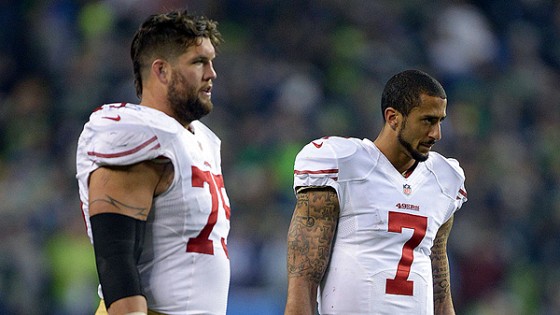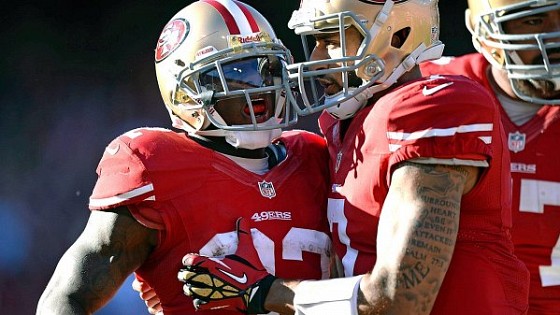There has been a great deal of discussion and concern within the 49er fan base regarding the apparent switch from the Gap/Power Blocking Scheme to the Zone Blocking Scheme (ZBS). Conventional wisdom holds that offensive linemen in a gap scheme should be bulky and strong to succeed in the man-to-man drive blocking that is necessary to the success of Power, Counter, Iso, and other gap scheme running plays. Conversely, it is widely accepted that offensive linemen must be agile, flexible, and cerebral to transition smoothly from one block to another in lateral combination blocks that are vital to zone running plays.
The greatest concerns seem to center around two presumptions:
- That a line that was built to run power and counter would be ill-suited to run zone plays.
- That teaching a completely new blocking scheme to the offensive line would result in an increase in mental and technical errors early in the season, where our schedule is very tough.
The power running line that 49er fans have grown accustomed to is really pretty much gone. In 2010, Trent Baalke and Mike Singletary drafted Anthony Davis and Mike Iupati, adding two physical, big-bodied linemen to a group that already featured big road graders in David Baas and Tony Wragge. None of those players are 49ers anymore.

Kirby Lee-USA TODAY Sports
Of the remaining 49er offensive linemen, only Alex Boone seems specifically suited to a gap/power scheme. Boone is fast and light enough to succeed in a ZBS offense, but he has appeared to struggle with change of direction and maintaining low pad level while moving laterally. His movement issues are likely to be more problematic on the interior of the line, where zone plays would require him to block in combination with another offensive lineman on nearly every play. If he wins the competition at Right Tackle, he could potentially mask his movement deficiencies by using his length to control the edge.
Erik Pears was considered a valuable asset in Buffalo through 2012, where he thrived as both a pass protector and a run blocker in Chan Gailey's offense, which incorporated a ZBS running attack. In 2013, Doug Marrone replaced Gailey, instilling an offense that depended primarily on a Man/Gap Blocking Scheme. Pears was miscast as a power blocker and struggled heavily. If we truly trend more toward a ZBS this year, Pears could surprise many by emerging as a strength of the offense.
Dan Kilgore already wins with technique, leverage, and good feet, so he is a natural fit in a ZBS. The same can be said for Marcus Martin and Brandon Thomas, both of whom were highly regarded for footwork and mobility more than road-grading power. Zone blocking teams also tend to replace injured linemen more efficiently, since their combination blocking depends more upon specific rules and technique than the particular tendencies of each individual lineman.
Beyond the changing of the guard along the offensive line, changing personnel at running back should also pave the way for success in a ZBS. While Carlos Hyde found room to run with power, counter, and draw, he was consistently more productive on zone running plays. His downhill style and tendency to make one cut and get vertical give him an opportunity to pick a gap and get into the secondary quickly, negating the only true weaknesses in his game: below average vision and patience.

Bob Stanton-USA TODAY Sports
Kendall Hunter has been a big play threat on any manner of run play, and no one less than Frank Gore went out of his way to exhort Hunter's vision, toughness, and football acumen. When healthy, Hunter has consistently maintained a high yards-per-carry average, gaining yards in chunks on runs attacking both the inside and outside of defenses. Hunter's versatility should allow for success in either blocking scheme, but zone blocking plays should allow him more opportunities to take advantage of his vision, acceleration, and speed.
Reggie Bush is expected to be more of a factor in the passing game than in the running game, but he found some success running zone plays in Sean Payton's offense with the Saints.
The offense is not exactly switching from a pure power scheme to an exclusively zone running offense. Zone blocking is not new to the 49ers offense. It has been in the playbook every year, and was used more last year (likely due to Hyde's success on zone plays) than it had been in years past. Additionally, Jim Tomsula is on record stating that the offense will continue to run power. One specific reason given for trying Boone out at left guard was to retain the ability to pull a physical guard on power plays.
The real change in scheme will be using stretch plays for outside runs. I can't remember the last time I saw the 49ers run a stretch play. In the past, the 49ers have found success running a classic sweep play on outside runs, pulling linemen to get additional play side blockers to seal the defense to the inside while the back (usually Hunter) outruns the defense to the edge. The stretch play is vital to the sustained success of zone running. Other than the block on the play side end man on the line of scrimmage (EMOL), a stretch run looks nearly identical to an inside zone run, based upon the blocking scheme. The offensive linemen still take their zone steps and still partner with a neighboring lineman to account for an opposing lineman and linebacker.
On an inside zone play, the EMOL is influenced to widen by an outside first step by the play side tackle or tight end. The play is intended to cut back inside of the EMOL, wherever the widest gap in the interior line opens up. On a stretch play, the play side tackle or tight end attacks the outside shoulder of the EMOL, providing a running lane to the outside, allowing the running back to attack from the edge all the way to the sideline. By using the stretch play as the primary outside run, defenses must constantly respect the lateral flow of an inside run play, or risk giving up a huge gain on an outside run. That respect for the stretch play allows the offensive line to open up gaps between laterally flowing defensive linemen for an inside zone run.
Together with bootlegs out of zone action, which the 49ers have not run with great frequency, stretch plays keep the defense guessing, and make linebackers hesitate and question what they are seeing. Inside zone, outside zone (stretch), sprintout passes, and all passes off of zone run action (including bootlegs) all begin with similar footwork and movement from the offensive linemen, leading defenders to frequently guess incorrectly when diagnosing a play.
Offenses that run a ZBS often enjoy better pass protection as well. The tendency of ZBS teams to employ lighter, more athletic offensive linemen could allow those linemen to stay in front of pass rushers, providing the quarterback with a more secure pocket. Additionally, offensive linemen are required to block in tandem on zone runs, often exchanging blocking responsibilities with line mates during the play. If this seamless cooperation carries over to pass protection, one could expect a line employing a ZBS to be more adept at protecting against stunts and elaborate blitzes.
Finally, zone runs do not require pulling offensive linemen, so play action passes do not need to jeopardize protection by pulling a lineman to make the run fake more realistic.
Whether the 49ers' running game moves to 50% zone runs or 90% zone runs, 49er fans should expect increased offensive versatility, decreased read and react speed from opposing defenses, better pass protection, and less dependence upon perfect health along the offensive line. The move towards zone blocking, however dramatic the move is, should allow the 49ers to make better use of their personnel and produce more efficiently and consistently on offense.

